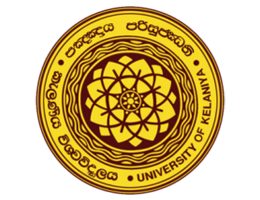University of Kelaniya

The University of Kelaniya has its origin in the historic Vidyalankara Pirivena, founded in 1875 as a centre of learning for Buddhist monks. It was one of the two great national centres of traditional higher learning, heralding the first phase of the national movement and national resurgence.
With the establishment of modern Universities in Sri Lanka in the 1940s and 1950s, the Vidyalankara Pirivena became the Vidyalankara University in 1959, later the Vidyalankara Campus of the University of Ceylon in 1972 and, ultimately, the University of Kelaniya in 1978.
Today, the University of Kelaniya is one of the major national Universities. It is located just outside the municipal limits of Colombo, in the ancient and historic city of Kelaniya, on the north bank of the Kelani River. It has two major campuses, seven locations, six faculties and four institutions.
The University of Kelaniya has pioneered a number of new developments in Higher Education. It was one of the first Universities to begin teaching science in sinhala, and also the first to restructure the traditional Arts Faculty into three separate Faculties of Humanities, Social Sciences and Commerce and Management. It also has several unique Departments not generally found in the Sri Lankan University system and some Kelaniya innovations have been adopted subsequently by other Universities. These include the Departments of Industrial Management and Microbiology in the Faculty of Science; Departments of Linguistics, Fine Arts, Modern Languages and Hindi in the Faculty of Humanities; and Mass Communication and Library and Information Sciences in the Faculty of Social Sciences.
In Keeping with its historical root, the University is one of the national centers of excellence in Pali and Buddhist Studies and related fields. It has long established and well-developed Departments of Pali and Buddhist Studies (incorporating chairs in Buddhist Civilization and Buddhist Philosophy), Sanskrit, Linguistics, Philosophy, Sinhala, and Hindi, as well as the Postgraduate Institute of Pali & Buddhist Studies. Kelaniya also maintains close links with the Buddhist and Pali University of Sri Lanka (whose Vice-Chancellors have often been drawn from the University of Kelaniya Faculty). Thus, the University of Kelaniya forms the centre of an academic complex, specializing in modern developments in traditional disciplines. It also retains a close link with its mother institution, the Vidyalankara Pirivena, whose Head is also the Chancellor of the University.
At the same time, the University of Kelaniya has a modern and multi-cultural structure and perspective, with the Faculties of Science, Medicine, Social Sciences and Commerce & Management and a strong base in modern languages, including the teaching of Chinese, English, French, German, Hindi, Japanese, Russian, Tamil, and Modern Linguistics. Presently engaged in extensive restructuring as it enters the 21st century, the University of Kelaniya looks forward to a new phase in its 125-year history of development.
